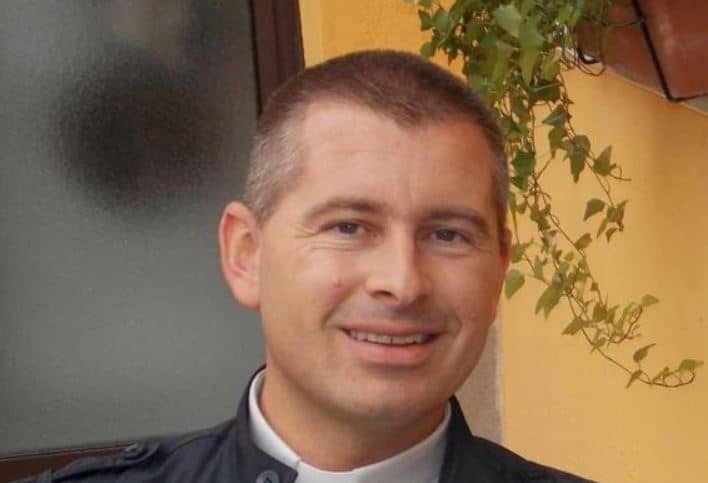ROME – It would be easy for Westerners coming into this month’s summit of bishops on young people to think that clerical sex abuse should be the main, if not only, focus. But a closer look at statements and documents emerging from the gathering shows that other issues such as immigration remain a pressing and shared concern.
“Sometimes [immigrants] are treated like animals,” said Cardinal Dieudonné Nzapalainga of Bangui in the Central African Republic during a press briefing Oct. 6, “or they are welcomed only if they are useful for something.”
“No, they are human beings and must be treated as such. This is the issue that we brought into the synod and we hope that it will be addressed,” he said.
The cardinal was one of several clerics and Catholic speakers who voiced their concern for the welcoming of immigrants and refugees in a global climate where populism and xenophobia are on the rise.
“In our country many young people ask: If I stay I die, if I leave I die, so what do I choose?” Nzapalainga said. “Those who leave always have their reasons, and the Church must accompany them, [because] they are people, not animals.”
Concern for migration was also evident in small group discussions, where bishops and young people address some of the next generation’s main concerns. While sexual abuse, gender identity and sexuality were part of the conversation, the sense of loneliness for many young people in displaced communities – not just physically, but also online – was a far more recurring theme.
One of the French language groups outlined a four-step approach for the Church to tackle the question of immigration, thereby becoming a political and social “prophetic voice.”
- Spreading Church doctrine on immigration and the phenomenon of human mobility.
- Promoting encounters between continental or regional episcopal conferences touched by immigration to address the issue together.
- Helping churches that receive migrants to put in action a pastoral approach for improving their condition.
- Easing up relations with international institutions, and between countries of departure and welcome for immigrants.
The predominance of the question of immigration in the working groups points to an increasing desire for welcoming among the young. In the United States, young adults between the ages of 18-29 overwhelmingly say immigrants do more to strengthen (82 percent) than burden (13 percent) the country, according to a 2017 Pew Research Center Study.
While observers may have to wait to see the practical action they might hope for in terms of the clerical sex abuse crisis, clergy from all over the world are already taking practical steps that cater to many young people’s demand for welcoming immigrants.
Cardinal Reinhard Marx of Munich, for instance, recently donated over $50,000 for the “rescue of lives in the Mediterranean” to the German NGO ship Lifeline. The action was made even more significant as the populist coalition governing Italy has greatly limited the rescue of immigrants at sea and closed its ports to migrants, which has created a significant vacuum in terms of salvaging vessels in the Mediterranean.
On this note, Italian Cardinal Giuseppe Versaldi, Prefect for the Congregation for Catholic Education, criticized the Italian government’s hard line on immigration.
“Closed ports are not of the Church,” he said during a briefing last Saturday, adding, “the Church opened the doors to those who had closed ports.”
An opportunity for episcopal conferences to discuss the topic of immigration will take place in December, when the Italian Bishops’ Conference (Cei) has organized a gathering with bishops from Mediterranean countries to look for practical responses.
“There is a remarkable absence of Europe in regards to the migration phenomenon,” said Archbishop Bruno Forte of Chieti-Vasto in Italy, who is a member of the drafting committee for the final document of the synod, during a press briefing Oct. 11.
“Yet migrants are a precious strength,” he added, “[because] they have allowed for the Italian economy to improve many times.”
The Church in Italy has been a vocal opponent of the policies restricting migration created by the Northern League right-wing populist party. Its leader, Matteo Salvini, recently rammed through legislation authorizing tougher rules on immigrants, increased opportunities for deportations and greater funds for border patrol.
As anti-immigration rhetoric deepens its grip on the Italian population, the Catholic leaders are striking a discordant note.
“How is it possible that this culture of fear and exclusion has become so rooted in the choices of many male and female politicians, who have – let’s not forget – an ample and widespread electoral base in our countries and in our parishes?” asked Father Roberto Camillotti, director of the Diocesan Caritas, in an editorial on Monday on Italian weekly L’Azione.
Last weekend the head of the Italian Caritas, Father Francesco Soddu, also spoke out against anti-immigration policies and campaigns, singling out the particular case of Italy’s new government.
“Agitating the specter of an invasion is against the Gospel,” Soddu said during a conference this weekend in Rome of members of the Church movement Christian Rebirth, which focused on democracy, global citizenship and integral ecology.
“The instrumentalization of existing fears represent the greatest danger to create policies that seem to question the principles of the common good, welcoming, tolerance, solidarity,” he said.
The global Church may be behind in terms of tackling the sexual and economic scandals that have tarnished its credibility, but churchmen are often in the forefront of immigration debates.
There is a growing “aptitude toward egoism,” said Bishop Cristobal Lopez Romero of Morocco in a recent interview with Vatican Insider. “We know that in Europe, among those who oppose the presence of immigrants, there are also people who go to Mass every day. It’s sad to see that many faithful cannot see the face of Christ in these suffering brothers.”
















